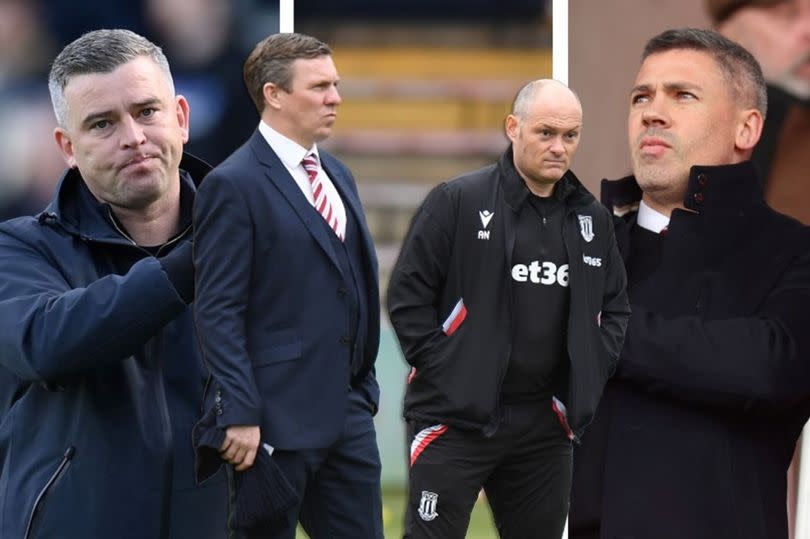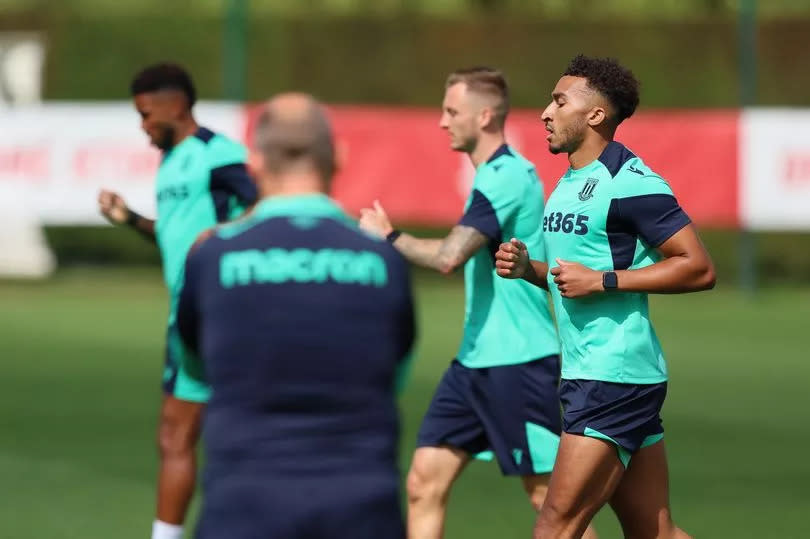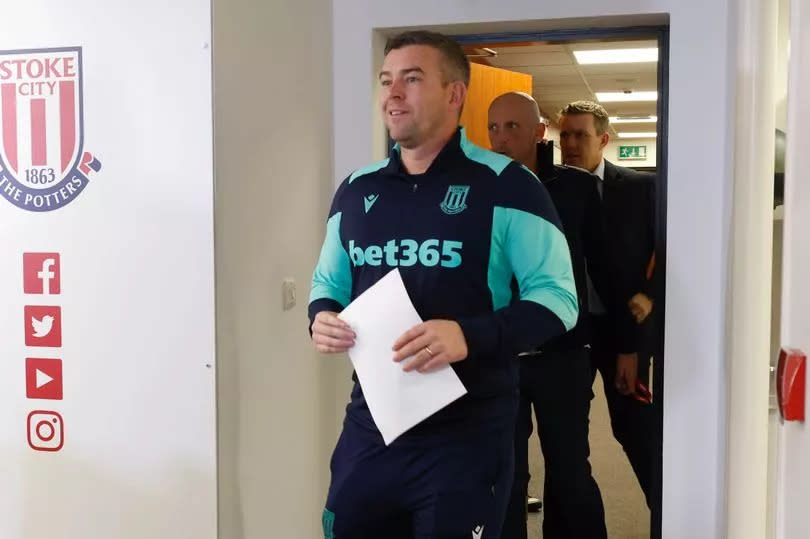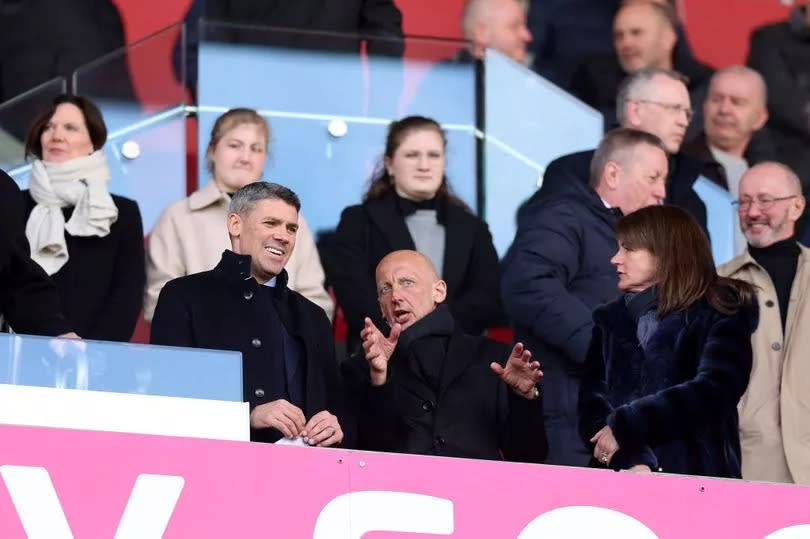52 transfers, two big sackings and what really happened in 12 unprecedented months at Stoke City

It is quite irritating to think that at some point in the future, a supporter or reporter will look back at 2022/23 (16th with 53 points) and 2023/24 (17th with 56 points) and think not much had happened.
Yet It has been an epic journey to go nowhere. There have been 52 transfer deals and at least a dozen more that were close, one manager sacking, one technical director leaving, a head coach arriving, a new sporting director, a player demoted to train with the under-21s, a heart-stopping fight against relegation, more missed penalties, the youngest league player in 65 years, international call-ups, freak injuries and a late surge of support on a wave of growing optimism.
So they might have gone nowhere but they’re in pretty much a different car now, with different drivers. It’s the same intended destination but a different map. Where to begin with the story of 2023/24?
The build-up to an unprecedented summer window
Let's go back to January 2023 when Stoke were heading into the final chapter of the worst constraints in a three-year rolling Financial Fair Play cycle.
Every penny counted to avoid punishment, including a bonus for FA Cup wins over Hartlepool and Stevenage. In the end it took the £500k sale of Joe Bursik to haul the club away from trouble and the deadline day £15 million sale of Harry Souttar to set them up nicely for an unprecedented summer.
Alex Neil could have spent at least a chunk of that cash in the final hours of that window but he admitted it wouldn’t have been value for money and he kept his powder dry and transfer war chest locked up ready for three months of relentless squad building. The problem was that, apart from an exciting March, they limped to the finish line and Neil didn’t have much stock to fall back on if he didn’t start the new term with a bang.
READ MORE: What £935m deal will mean for Stoke City in EFL shake-up
READ MORE: Stoke City end of season player ratings for 35-man squad
Still, it had taken years of scaling back to get to this point. The retained list confirmed the exits of Nick Powell, Morgan Fox, Phil Jagielka and Sam Clucas and there were only five senior players left on the books who would be a serious part of Neil’s plans going forward. Josh Tymon, Tom Edwards, Connor Taylor and Jacob Brown would leave soon enough.
But the hard reset didn’t just stop in the changing room.
John O’Shea left as first team coach too. Head of football operations Andy Cousins had been sidelined since Ricky Martin had arrived as technical director and left for Chelsea, chief scout Tommy Coakley went to Bournemouth. Martin went into the academy too. Fans’ favourite Kevin Russell was out, as well as head of coaching Jimmy Hunter and development coach Danny Pugh.
Under-18s coach Rich Walker went to Wolves and academy director Gareth Owen only stayed after a U-turn, perhaps knowing someone needed to try to hold things together. Alex Morris joined in an under-21s/first team hybrid role, Ryan Shawcross would start with the 18s and end leading the 21s and Paul Gallagher joined the first team coaching set-up.
But the trigger wasn’t always being pulled with a replacement in mind. Head of sports science Paul Walsh was given his cards on the eve of pre-season. He ended up at Bolton Wanderers winning promotion from League One and, although the department isn’t a one-man team, that lead role stayed vacant until Matt Bickley joined from West Brom in November. We haven't even touched here on the women's team, which turned semi-pro and was also brought into Martin's remit.
EXTRA READING: Everyone who joined and left Stoke City in huge Ricky Martin reset
The expected flood of new signings didn’t immediately materialise and there was no new head of recruitment until the first day of pre-season. Adam Henshall had decided to stay at Aston Villa, where he was head of emerging talent, and it wasn’t straightforward to get a visa for American Jared Dublin, who had only joined Reading from Sheffield United as head of scouting four months previously.
That is not to say that Neil and Martin were not relentlessly positive about the work they were overseeing.
“Obviously we've got a lot of work to do between now and then to assemble the squad and get a team functioning and getting us ready,” said Neil on the day that fixtures were released. “The strange thing is that we've got four games before the window ends so albeit, that first game will give us a flavour of where we are and what we’re looking like, but it's certainly not going to be the end of what we do between now and the sort of end of August.”
The problem with needing so much was that Stoke couldn’t really sit tight and wait for the players they really wanted for the starting XI or focus on a select few. They really needed players. All the way through the team and all the way through the squad. There were so many inquiries and bids in at one stage that there was a secondary worry about what would happen if they might all came off.

Enda Stevens was finally the first one through the door in on July 5. He had missed much of the last two years at Sheffield United but Neil pointed to the fact that he had picked up different injuries rather than having one chronic problem and didn't think availability would be a problem.
Neil held talks with Ellis Simms in Manchester but Everton’s asking price was getting out of hand and the striker went to Coventry, cash rich following the sale of Viktor Gyokeres. Haji Wright was on Stoke’s radar too and he ended up following Simms while there was a belief that Stoke had won the race for Jaden Philogene, who was spotted at Clayton Wood but ended up going to Hull.
Ben Pearson and Ki-Jana Hoever were loanees from the second half of 2022/23 who returned on a permanent and loan basis respectively and Daniel Johnson came in as a free agent after playing for Jamaica at the CONCACAF Gold Cup to reunited with his old Preston boss.
Stoke took up the offer of a subsidised deal for Aston Villa striker Wesley on a free transfer. It was a one-year contract apparently costing four times less than it would have taken to land another target man on their list, Kieffer Moore. Wesley was a big guy – he broke the machine when he did his strength testing – but he never looked like breaking his goal duck.
But a key moment in the window had already passed by that point: a change in work permit rules that meant clubs in the top two divisions could sign up to four ‘wild card’ players from abroad who didn’t meet strict visa criteria. It completely changed the pond that Stoke were fishing in.
“We’re basically looking all over the world really. That’s what the Championship is, a global market now,” Neil told StokeonTrentLive.
Young Galatasaray centre-back Emin Bayram was too expensive, however, and Adrian Leon Barisic, a walloping 6ft 4in 22-year-old, was a top target at centre-half but opted to go from Osijek to FC Basel – who Stoke would plunder for midfielder Wouter Burger.
And there were the kind of exotic left-field arrivals that Stoke hadn’t made for at least five years or in some cases, ever. Andre Vidigal (Maritimo), Ryan Mmaee (Ferencvaros), Mehdi Leris (Sampdoria), Bae Junho (Daejeon Hana Citizen) and Nikola Jojic (Mladost Lucani).
Perhaps the Jojic and Leris deals – plus the signing of Lynden Gooch from Sunderland and the subsequent arrival of Million Manhoef in January – highlight the difficulty of what Stoke were trying to do. They had missed out on Philogene on the right wing and ended up with four, one of whom hasn’t been able to make an impact for the under-21s, while relying on Stevens alone at left-back and Ben Wilmot, Michael Rose and Luke McNally at centre-half.
Injuries and decisions to rue in stuttering start
The football got underway with a fizzing 4-1 opening day win over Rotherham when Vidigal scored twice and there was a plucky 1-0 win over Watford when Vidigal scored again plus eye-catching home cup wins over Rotherham (6-1 this time) and West Brom. They were unlucky in defeat at Millwall but if there was hope building running up to the end of the window, a 2-0 home defeat to Preston on the day after deadline day, going into an international break, was painfully deflating. The away end serenaded Neil, Gallagher, Johnson and Pearson about being a bad old version of their own club. Neil had wanted his old North End stalwart Ben Davies too.
There was to be no quick pick-me-up. Injuries suddenly started to build. Vidigal – who had scored five in his first six appearances – and Mmaee were pencilled in as two leading men in attack. Out. Stevens. Out. Hoever returned from Holland under-21s duty and went straight into the treatment room.
Neil took a 2-2 draw at Huddersfield badly despite or because of what had been a pretty dominant performance except the scoreline. “At the moment the emotion is probably just anger really,” he said at full-time. “We’ve put in a really good performance but not won the game.”
That feeling got worse rather than better when Stoke then played poorly in a home defeat to Hull and soon Stoke fans in the away end at Bristol City were smelling blood at 2-0 down after 14 minutes. But a tremendous Leris goal kept the game alive, Sead Haksabanovic, brought in on loan from Celtic, levelled and youth graduate Nathan Lowe, just turned 18, scored a fairy tale late winner.
They might have built on that when they went toe-to-toe with Southampton three days later. Except Wilmot smashed his knee in colliding with a post trying to block a shot that was blocked before it got to him and Lowe was denied a stone cold penalty. By referee group PGMOL’s own analysis, Stoke should have been awarded six penalties in their opening 10 games – but they got none.
Neil said: “It does seem that sometimes you have the rub of the green when everything goes in your favour and there are other times when things you can’t control don’t go in your favour at all. Unfortunately at the moment when it comes to injuries or incidents in games, that seems to be the case.”

Next up was a trip to runaway leaders Leicester and midfielder Josh Laurent – who had been promoted to captain in pre-season – was asked to step in as centre-back. It was a defence-first performance and Stoke went into another international break on the back of another 2-0 defeat, with daunting fixtures coming up against Sunderland, Leeds and Middlesbrough and the manager under growing pressure.
Stoke pulled something from their deep reserves to win those three matches. A dramatic late 1-0 victory over Leeds was capped by a red and white light show and Neil spoke privately about how he felt it all coming together and how Stoke felt that night like a big club emerging from its slumber. He wouldn’t taste victory at home again. He wasn’t helped by another injury, this time not even at Stoke. A problem with Bournemouth keeper Neto meant Mark Travers was recalled from loan.
The 0-0 draws that followed against Cardiff and Coventry were seen as either building on those quickfire nine points or falling a little off the pace – but they would return from another international break with four straight defeats to a series of late, late goals that would lead to the axe being sharpened.
The first, a 3-0 home thumping by Blackburn, particularly stung. Neil had known that his big task was to sort out the form at the bet365 but this was a damp case of déjà vu, unthreatening going forward and picked off too easily at the back. There were more complaints about big refereeing decisions in a 4-2 mid-week defeat at QPR and a furious reaction to a 2-1 loss at Plymouth.
Stoke had led through Tyrese Campbell but Steven Schumacher's Plymouth turned it around to win in the 97th minute. Neil had to walk past a packed and enraged away end to get to the tunnel. He admitted afterwards that he didn’t want to appear patronising by clapping their loyalty through the rage but keeping his head down didn’t solve anything.
Up to that point, he had seemed to have complete conviction in chats on and off the record that he would lead Stoke to the Premier League. Heading into a home match against Sheffield Wednesday the following weekend – when Jack Bonham, who had been back-up keeper to Travers, fell ill to the point where he needed to be checked over in hospital – that conviction had gone.
Stoke should have won a dire match. They were even finally awarded a penalty – but Mmaee missed and they conceded a breakaway winner in the 91st minute. The home stands turned on the home dug out and Neil arrived at Clayton Wood the following morning to be told he could clear his locker and go straight home.
He had won 18 of 60 matches in charge of Stoke City, had overhauled the squad and left them 20th, two points above the relegation zone with three games to go until the half-way point of the season.
Neil makes way for Schumacher
That Plymouth match, when players had left on the train for a Christmas party in London, must have left its mark on chairman John Coates. Gallagher oversaw two fixtures in caretaker charge – draws with Swansea and West Brom – and then Schumacher was brought in from Home Park as new head coach.
He was unveiled alongside Martin, who had been recommended for his own role by Neil, having worked together at Norwich. If some thought Martin’s position had been compromised by Neil's he made it clear that he saw himself as having led or even been in charge of the recruitment process for his mate's replacement, working through 50 or 60 candidates
Coates had met contenders on a short-list himself and took references before flying Schumacher up to the Potteries, along with backroom team Mark Hughes – not that one, Peter Cavanagh and Darren Behcet. Elliot Turner would join soon as head of performance too. And midfielder Luke Cundle would end a loan deal with Plymouth as well to spend the second half of the season with Stoke.

It was a whirlwind start to life. Appointed on December 19, first training session on December 20, met the press on December 21, first game on December 23 and then playing again on December 26, 29, January 1 and January 6. Extend that to January 13 and it was encouraging too. There were away wins at Birmingham and Rotherham, solid draws with Millwall, Watford and Ipswich.
Supporters even left a home defeat to Birmingham on January 20 with a spring in their step. “I think for the people who watch Stoke every week, that’s the best football I’ve seen Stoke play for a long, long time,” said our old friend Tony Mowbray, who probably needed to be taken with a pinch of salt. “Steven deserves a lot of credit for that because they haven’t been much of a ball retention team but I thought they were good today, Stoke.”
But one unfortunate defeat became, again, four in a row. The fourth, at Blackburn, particularly stung. This time Blackburn were in crisis mode themselves but Stoke were 3-0 down inside 37 minutes and the packed away end was livid and even angrier when Johnson scuffed a penalty chance to set up a miracle comeback.
Players were told they weren’t fit to wear the shirt and the switchboard for Praise & Grumble was so busy it had to be extended for an extra hour. It was all grumble. Stoke would beat QPR at home in their next match but it was too much for Martin to survive. He was the last blood on the carpet of his own ruthless reset. In came Jon Walters, a Stoke legend who had been doing the prep work for a role like this since hanging up his boots in 2019.
There would be one more backwards step. A dispiriting 2-1 defeat at Cardiff landed Stoke in the relegation zone for the first time. Players held clear-the-air talks in the changing room with the bottom line being that, once they left Wales, the time for talking was over – they had to pull their socks up and dig Stoke out of the hole they had dug themselves into.
The response to a rallying cry
Walters’ first main job was to act as a unifying figure and build a bridge between fans and team, starting with a home match against Middlesbrough.
“I know for many years there has been a disconnect but I’m not going to come in and point the finger and say, ‘He is to blame’ or, ‘He is to blame,’” he said. “We’ve got to look forward. From now, from today, from the weekend, it’s the first game of the season. We’ve got 12 games to go.
“I think the DNA of this club, the DNA of Stoke City, is that when the chips are down we stick up for each other. The people from this area, I class as my people, I’m one, we stick up for each other.
“We’ve got a young team, a lot of players coming from different parts of the world, who don’t know what this place can really be like. They need you. We’ve got a very, very, very good young head coach, one of the best in the country in my opinion, who needs you. He doesn’t know what this place is like when it’s rocking. I need you.
“So this is a call to arms really. Let’s get this place, for the first 10 minutes, rocking. Sing Delilah until your heart bleeds, let’s get every song out there for 10 minutes. Give me 10 minutes.”

The atmosphere, in turn, was electric and players found something extra in their tank to win 2-0. In fact, Stoke won six and drew three of those 12 matches after the Cardiff game. Only three teams in the division picked up more points in that time – a similarly-galvanised Millwall side, promoted Ipswich and, ironically, Middlesbrough.
It still went too close to the wire for anyone to relax. Wilmot admitted that at 1-0 down to relegation rivals Sheffield Wednesday in the fourth-from-last game he knew in the pit of his stomach about the importance of what came next, which turned out to be a superbly-taken equaliser from Cundle.
Then the last three games were like a dream, played at an intensity level rarely seen at Stoke since, well, the days of Walters in the forward line. A 3-0 win over Plymouth lifted Stoke to 50 points, a 1-0 win at Southampton secured safety and a 4-0 thrashing of Bristol City was the icing on the cake; 56 points, three more than 12 months previously.
Four of the starting XI have headed back to their parent clubs, one – Campbell – has been released and there are talks ongoing with Stevens about extending his stay.
So another rebuild lies ahead, just not on the same scale and not with the same blueprint.

 Yahoo News
Yahoo News 
